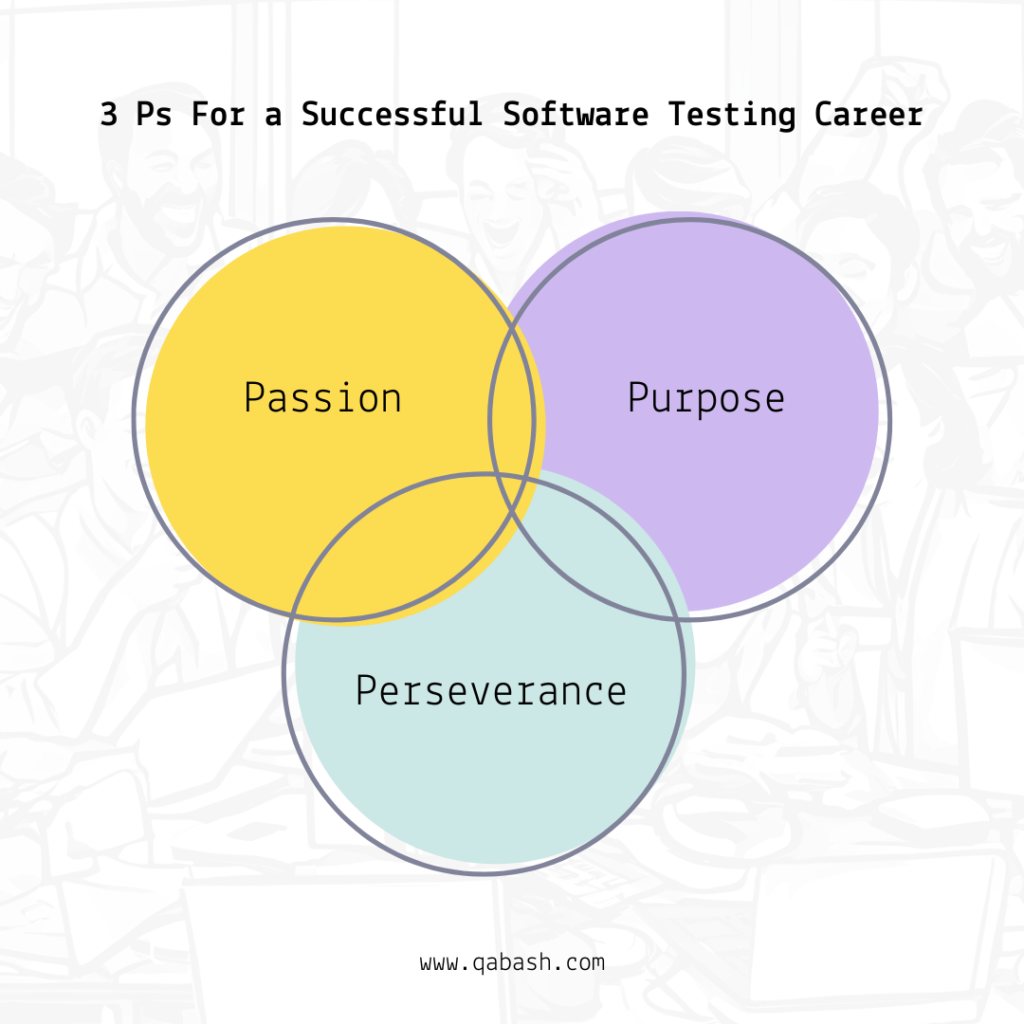Have you heard of any secret formula for a Successful Software Testing Career?
The software testing industry is constantly evolving, and to thrive in this field, technical skills alone are not enough. The “3 Ps”—Passion, Purpose, and Perseverance—are vital ingredients that can significantly influence your journey to success as a Software Tester or Test Automation Engineer.
Today, we will explore how these three attributes can shape your career, provide real-life examples, and outline strategies to cultivate them for sustained career growth in the software testing domain.

1. The Role of Passion in Software Testing
Passion is the fuel that keeps you excited and motivated in your software testing career. It’s what drives you to explore new tools, learn automation frameworks, or stay up-to-date with the latest testing trends.
Why Passion Matters in Testing?
Software testing involves a lot of creativity, problem-solving, and persistence. Without passion, this can quickly turn into a mundane task. Here’s why passion is essential:
| Benefit of Passion | Impact on Software Testing |
|---|---|
| Continuous Learning | Passionate testers are more likely to stay current with industry trends, adopting new tools and methodologies like Test-Driven Development (TDD) or Behavior-Driven Development (BDD). |
| Attention to Detail | When you are passionate, you dive deeper into test cases, ensuring every scenario is covered, reducing the chance of bugs slipping into production. |
| Improved Problem Solving | Passion helps testers think outside the box, leading to better test case design and innovative solutions for complex software issues. |
Example: A passionate tester might not just stop at finding a bug but will also investigate its root cause, propose improvements, and work closely with developers to ensure the issue is truly resolved.
How to Cultivate Passion?
- Stay Curious: Make learning a continuous process. Enroll in courses, attend webinars, or participate in community forums related to software testing and automation.
- Explore Different Tools: Don’t just stick to one tool or framework. Experiment with Selenium, Cypress, Playwright, or new test management platforms to find what excites you.
- Follow Industry Leaders: Keep track of testing influencers, read blogs, and join discussions on platforms like LinkedIn to stay inspired.
2. Purpose-Driven Testing: More Than Just a Job
Purpose gives direction to your career in software testing. It’s what makes you see the bigger picture and align your personal goals with the objectives of the organization you’re working for.
The Importance of Purpose in Software Testing
When you work with purpose, every test case you design and every bug you find has a clear rationale behind it. You’re not just testing for the sake of it; you’re contributing to the overall success of the product.
| Purpose-Driven Testing | How It Impacts Career Growth |
|---|---|
| Clear Objectives | Purpose allows testers to design tests with business goals in mind, such as improving user experience or ensuring performance scalability. |
| Stronger Collaboration | Testers with a sense of purpose work better with developers, business analysts, and stakeholders, aligning their efforts to create quality software. |
| Higher Job Satisfaction | Having a clear purpose can lead to a sense of fulfillment and satisfaction in your role, reducing burnout and improving productivity. |
Example: A tester working with a purpose might focus on critical areas like performance testing for an e-commerce website before a big sales event, knowing that any downtime could result in revenue loss.
Defining Your Purpose in Testing
- Understand the Business Impact: Instead of focusing only on technical tasks, learn about the business objectives behind the software you’re testing. This will give your work a sense of purpose.
- Set Personal Milestones: Align your personal goals (e.g., becoming proficient in automated testing) with your organization’s needs, making your testing efforts more meaningful.
- Mentor Others: Share your knowledge with junior testers or non-technical colleagues. Teaching can reinforce your sense of purpose as you help shape the future of software testing.
3. Perseverance: The Power to Overcome Challenges
The third “P”—Perseverance—is about resilience and grit. In the fast-paced world of software testing, challenges are inevitable. Whether it’s dealing with tight deadlines, flaky test cases, or complex automation setups, perseverance helps testers keep pushing forward.
Why Perseverance Is Crucial in Testing?
Testing can be repetitive, and automation scripts might fail for reasons that are difficult to debug. Here’s why perseverance matters:
| Challenge in Testing | Role of Perseverance |
|---|---|
| Flaky Tests | A persevering tester won’t give up on finding the root cause of intermittent failures, even if it takes multiple attempts. |
| Time Pressure | When deadlines are looming, testers with perseverance find ways to efficiently execute their test plans without compromising on quality. |
| Complex Bugs | Some bugs are hard to reproduce, but perseverance helps you explore different angles until the issue is fully understood and resolved. |
How to Build Perseverance?
- Embrace Failure as a Learning Tool: Not every test will pass on the first attempt, and that’s okay. Learn from the failures, debug patiently, and improve your testing strategy.
- Develop Problem-Solving Skills: Practice solving complex problems regularly to improve your resilience. This could involve tackling tough coding challenges or working on open-source testing projects.
- Set Realistic Expectations: Perseverance doesn’t mean pushing yourself to the brink. Set achievable goals and break down larger tasks into smaller steps to avoid burnout.
Conclusion: Balancing the 3 Ps for a Successful Testing Career
Passion, Purpose, and Perseverance are the pillars of a successful software testing career. While technical skills are essential, these qualities drive long-term career success. Passion keeps you motivated, purpose gives you direction, and perseverance ensures you overcome challenges.
By embracing the 3 Ps, you not only enhance your professional growth but also contribute to higher-quality software, better collaboration with teams, and a more fulfilling career in software testing.
FAQs
1. Why are the 3 Ps important in a software testing career?
The 3 Ps—Passion, Purpose, and Perseverance—help testers stay motivated, focused, and resilient, which is crucial for handling the challenges of the testing profession.
2. How can I find my purpose in software testing?
Finding your purpose involves aligning your testing efforts with the larger business goals of your organization and setting personal career milestones.
3. How do I stay passionate about software testing?
Stay passionate by continuously learning, exploring new testing tools, and following thought leaders in the software testing community.
4. What are the signs of perseverance in a software tester?
Perseverance in testing can be seen in how a tester tackles complex bugs, handles flaky tests, and manages deadlines without giving up on quality.
5. Can the 3 Ps apply to test automation roles?
Absolutely! Passion helps in learning new automation frameworks, purpose drives the creation of scalable and maintainable scripts, and perseverance helps in debugging and refining automation processes.
QABash Nexus—Subscribe before It’s too late!
Monthly Drop- Unreleased resources, pro career moves, and community exclusives.
